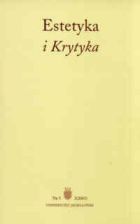To Destroy or to Reform? Controversies on Plato’s Antitheatrical Attitude
To Destroy or to Reform? Controversies on Plato’s Antitheatrical Attitude
Author(s): Magdalena MarciniakSubject(s): Philosophy, History of Philosophy, Ancient Philosphy
Published by: Wydawnictwo Uniwersytetu Jagiellońskiego
Keywords: Plato;theatre;comedy;tragedy;metaphor;legislation
Summary/Abstract: In my manuscript I engage Jonas Barish’s claim that Plato engenders an antitheatrical prejudice, arguing that Plato’s critique of poets’ creation (tragic and comic) is marked by ambivalence. To emphasize the tensions in Plato’s dialogues is not only to problematize the negative judgements against tragic and comic creation, but also to perceive Plato’s particular use of theatre in its metaphoric dimension to describe, inter alia, the phenomenon of human existence or ideal legislation. My main hypothesis is that to perceive this complexity, we must take into account the literal and metaphoric dimensions of poetry and theatre. Only then can we capture the genuine theatrical potential of Plato’s dialogues: not only critical but also reformative. Moreover, new possibilities emerge when we consider Plato as a playwright, and Socrates as his privileged character. In light of this complexity, we can contest Jonas Baris’ declaration of Plato as progenitor of the ‘antitheatrical prejudice’.
Journal: Estetyka i Krytyka
- Issue Year: 38/2015
- Issue No: 3
- Page Range: 7-20
- Page Count: 14
- Language: English

